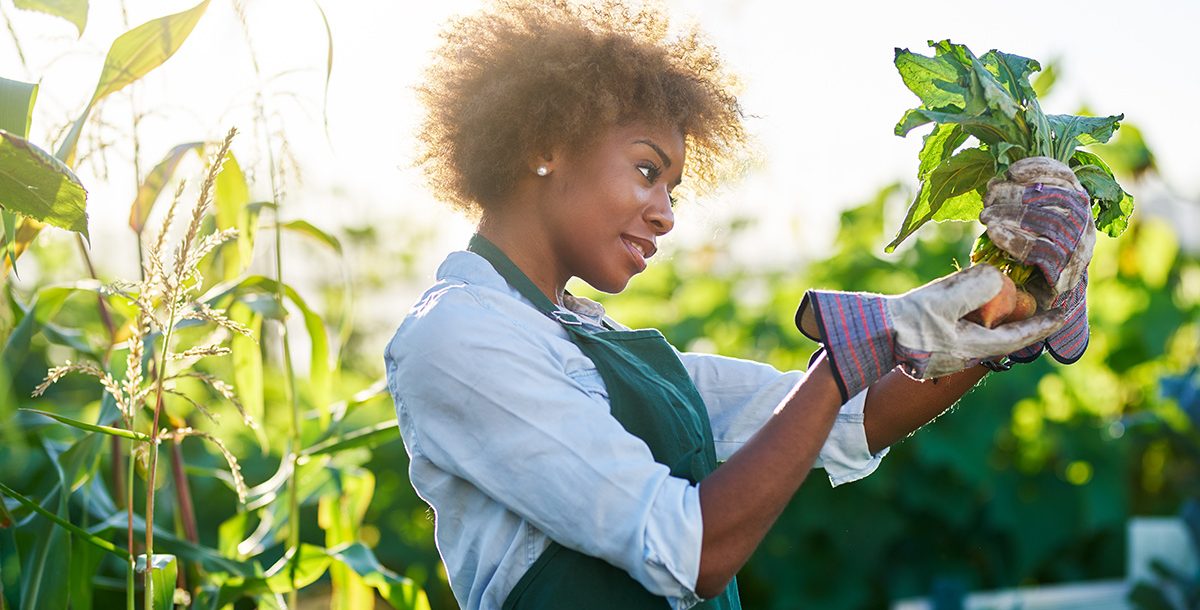Curious what crops grow best in Virginia and South Carolina gardens? We’ve got some answers for you.
Growing your own vegetables is a satisfying and delicious way to get your hands on fresh produce. Your success as a home gardener starts with choosing the best plants for your state. Here’s how to get started growing nutritious food right in your back yard.
Best crops for Virginia gardens
The growing season in Virginia begins in February for the warmer parts of the state. In the cooler sections, gardeners usually wait until March to start planting. The top crops for gardens include the following vegetables:
- Beans: If you’re in a cooler area, you can start beans indoors in May and transplant them outdoors in July. In a warmer spot, start beans indoors in March or April and transplant them to a garden in June.
- Beets: Plant beets outside in May and August for cooler regions. You can also transplant beets to your garden in April and September. If you’re in a hotter zone, transplant beets to your garden in March and September.
- Broccoli: Plant broccoli outside in May and August. If you start the broccoli indoors, you can transplant it to the garden in April and September. In warmer areas, plan to transplant this vegetable to your garden in March and September.
- Cabbage: Plant cabbage outside in June in cooler areas. The hotter your area gets, the longer you should wait to plant. If it’s quite warm where you live, wait until August or September.
- Carrots: Carrots have been a Virginian crop for hundreds of years. Plant them outside in May and September. If your climate is on the warmer side, you can start planting as early as March.
- Squash: Plant squash outside in June or July.
- Turnips: Start growing turnips in March if you’re in a cooler area. Consider planting turnips in February if you’re in a hotter spot.
Best crops for South Carolina gardens
Planting for fall harvests starts as early as February. However, it may begin as late as July or August in cooler areas. If it’s quite hot in your part of the state, your planting can begin in January for certain crops. It’s possible to grow a wide variety of vegetables in a backyard garden. But the following top the list of the best crops:
- Beans: Transplant beans to the outdoors in June. If you’re in a hot region, you can transplant your first crop of beans in March and do a second crop in October.
- Broccoli: In all areas across the state, you can transplant broccoli in February and September for spring and fall crops.
- Corn: Transplant corn in June if you’re in a cooler region. The warmer it gets, the earlier you can plant. In southern parts of the state, you can transplant corn as early as March and again in October.
- Onions: Plan to transplant onions in April or May.
- Peppers: In most areas of the state, you can follow the transplant schedule for onions. If you’re in the hot south, you can transplant peppers in March and September.
- Squash: Prepare to transplant squash in June. In the Charleston area, you can transplant squash in April.
- Spinach: Plant spinach in April and September if you’re in the northern part of the state. Plant the leafy green vegetable in March and October in other areas.
- Tomatoes: May is a great time of year to plant tomatoes outside in most parts of South Carolina. If you’re near the coast or in the south, as early as March is fine.
Creating your gardening space
Planning before planting is key when it comes to gardens. Draw out what you would like the area to look like. Shoot to plant your crops in three-foot-wide rows. This way you’ll be able to easily access and care for them while they are growing.
Controlling weeds is important when it comes to the success of your garden. During the planning phase, you’ll also want to consider that different crops need to be planted at different times.
Eating plenty of fresh fruits and vegetables is an important part of a healthy lifestyle, but it’s just the beginning. Explore the Healthy Living section of our blog to learn more about other wellness habits you can adopt now.
Learn more about the nutrition services offered at Bon Secours.





